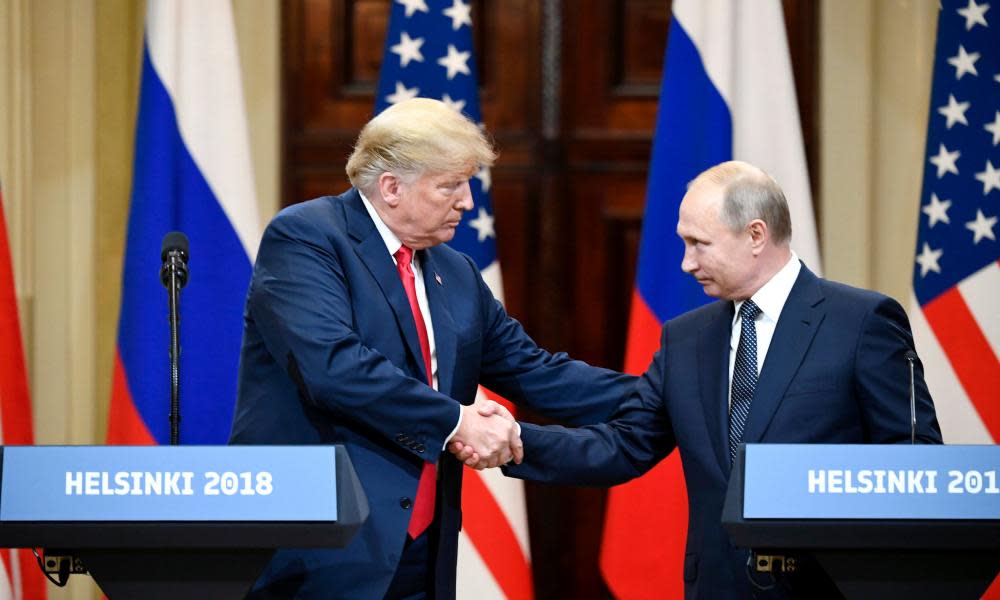Helsinki summit: what did Trump and Putin agree?

No communique was issued following the Trump-Putin summit in Helsinki, underlining the off-the-cuff informal diplomacy in which Donald Trump specialises. The absence of an agreed statement leaves secret the status and extent of any practical agreements reached either between the US president and his Russian counterpart or in the later wider meeting between officials.
But in the two leaders’ joint press conference on Monday, subsequent interviews and briefings, the outlines of some agreements emerged, with little sign that Russia has given ground in return for Vladimir Putin being brought in from the cold.
Economic relations
Putin, in his Fox interview, argued Russia was too large a country to be sanctioned and isolated, but Trump was not asked in the press conference about the future status of sanctions. Putin appears to be banking on a working party consisting of captains of industry to open a dialogue on future economic relations, pointing out US trade into the Russian market is minuscule in comparison with European trade. Putin is hopeful that business voices will call for sanctions to be lifted.
Crimea
The single greatest barrier to sanctions being lifted remains the Russian annexation of Crimea. Putin in his Fox News Interview said he and Trump had disagreed about the status of Crimea and in effect, the two men agreed to differ.
The Putin position is that Crimeans voted in a referendum to return to Russia, and this vote should be accepted, just as the Falkland Islanders voted in a referendum to remain part of the UK. There had been speculation that Trump would cede Crimea’s departure from Ukraine as a fait accompli so removing one reason to retain sanctions. On the wider issue of Ukraine, Putin said he had urged Trump to put pressure on Ukraine to do more to comply with the Minsk accords. He also laid down a marker that Ukraine must never join Nato.
Syria
The assumption in both leaders’ remarks was that the civil war in Syria was coming to a close, but Putin defended the need to crush terrorists in south-west Syria while keeping the forces of Syria and Israel separated, referring specifically to the treaty of 1974 that ended the Yom Kippur war and designated the lines of separation between Israel and Syria. He made no reference to the future status of Iranian-backed troops inside Syria, but Trump said the “United States will not allow Iran to benefit from our successful campaign against Isis”.
Neither Putin nor Syria is prepared to expel Iran from Syria. At issue is whether an agreement can be reached that keeps Iranian-backed militiax at a fixed distance from the Israeli border. “Creating safety for Israel is something both Putin and I would like to see very much,” Trump said.
Reconstruction of Syria
Trump appears to have gone further than the EU in saying he is willing to help with the reconstruction of Syria, something the EU has insisted must be conditional on a wider peace agreement. Trump set no condition, saying: “If we can do something to help the people of Syria get back into some form of shelter and on a humanitarian basis ... I think that both of us would be very interested in doing that and we are. We will do that.”
Putin did suggest he might be willing to merge the Astana talks – Iran, Russia, and Syria – with the so-called small group – France, Britain, Germany, Jordan, the US and Saudi Arabia – something that the French president, Emmanuel Macron, has sought for more than a year.
Nuclear talks
Putin said the two agreed to hold talks on the extension of the Start treaty that expires in 2021, but he said he wanted experts to examine whether the US was compliant with the terms of the treaty. He raised the perceived dangers represented by the US anti-missile defence system, but said he wanted to negotiate on the Intermediate Nuclear Treaty, the 1987 treaty that banned all US and Russian ground-launched missiles of intermediate range – between 500 and 5,000km .
Energy
Trump seemed to be more accepting than previously that a gas pipeline from Russia via the Baltic sea into Germany will be built. Putin promised he would continue to transmit gas through Ukraine once the current contract expires and after Nordstream 2 is built, so providing Ukraine with badly needed funds. But he said this was conditional on the dispute between Russia’s Gazprom and Ukraine’s Naftogaz being settled in the Stockholm arbitration court. The court earlier this year ordered Gazprom to pay Naftogaz a net $2.56bn saying the Russian gas giant did not fully utilise Ukraine’s gas pipeline to Europe as contracted. Gazprom has appealed against the decision and blocked an attempt to seize its European assets.
Putin’s conciliatory tone will be tested on Tuesday in Berlin in talks between Russia and Ukraine over the new pipeline, overseen by the EU.

 Yahoo News
Yahoo News 
